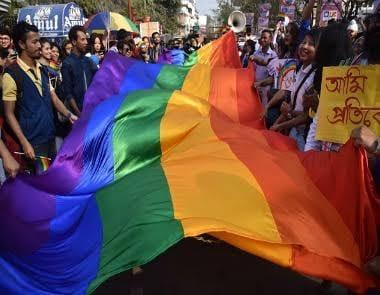Rainbow of Hope In Dark Times: SC Verdict On Section 377 Upholds Equality and Right To Love

THE long-overdue verdict of a Constitution Bench of the Supreme Court decriminalises homosexuality, reads down Section 377, and upholds the humanity and rights of Indians across the spectrum on the rainbow of sexual orientations and gender identities. The remarkably progressive verdict strikes a blow to centuries of bigotry and homophobia, and gets rid of a colonial-era law, Section 377.
The verdict penned by the Chief Justice of India began with a quote by the German writer Goethe: “I am what I am, so take me as I am.” The verdict affirmed that “Majoritarian views and popular morality cannot dictate constitutional rights. We have to vanquish prejudice, embrace inclusion and ensure equal rights.” This verdict is a breath of fresh air in stifling times when majoritarian politics is indeed seeking to suppress constitution rights and dictate people’s choice of diet, faith, clothes, partner, views, and ways of expressing themselves. The verdict’s affirmation that every kind of consensual love is love applies just as much to love between LGBTQIA people, and inter-caste and inter-faith love.
The verdict dismantles Section 377’s premise that homosexuality is “against the order of nature” by citing scientific research to show that homosexuality or bisexuality is “as much ingrained, inherent and innate as heterosexuality.” Justice Chandrachud called upon medical professionals to stop being a party to the stigmatisation of homosexuals by “trying to cure something that is not even a disease.”
Justice Indu Malhotra in her ruling affirmed that homosexuality and bisexuality are a “variation not an aberration.” Justice Malhotra’s verdict was especially significant because she declared that “History owes an apology to the members of this community and their families, for the delay in providing redressal for the ignominy and ostracism that they have suffered through the centuries.” This line is a welcome apology by the Supreme Court for its infamous 2013 judgement that recriminalised homosexuality by overturning the Delhi High Court verdict that had read down Section 377 in 2009.
The verdict is a huge victory for the courageous individuals and activists of the LGBTQIA community who braved stigma and risks in order to challenge the constitutionality of Section 377. Their courage is in sharp contrast to the pusillanimity of the Government of India which refused either to oppose or to support the decriminalisation of homosexuality, leaving the matter instead to the ‘wisdom of the Court.’ In the verdict Justice DY Chandrachud also criticised the Government of India for its posture of ‘neutrality’ that passed the buck to the Supreme Court instead of taking a firm stand against Section 377.
It is highly unfortunate and condemnable that several religious outfits - including Christian, Muslim and Hindu groups - have refused to accept the Supreme Court verdict, coming out instead with homophobic statements.
Several Opposition political parties (including the Congress and several Left parties) came out with statements welcoming the verdict. While many Left parties have been part of the struggle against Section 377, one conspicuous exception has been the SUCI (C) which has been homophobic on the issue. It is high time that all social and political forces claiming to be Left, democratic and progressive and to defend the innate and Constitutional equality and dignity of people, should stop expressing and tolerating homophobia. Some debates are settled debates: there should be no room for any homophobia in public discourse just as there can be no room for untouchability in public discourse.
While the Modi Government and the BJP claimed to be ‘neutral’ on the question of the equal rights of LGBTQIA people and failed to hail the verdict, the real ‘Mann ki Baat’ of the Sangh and BJP were expressed by many of their prominent spokespersons. The RSS, for instance, while stating that it does not support criminalisation of homosexuality, has nevertheless claimed that homosexuality is both unnatural and un-Indian. BJP MP Subramanian Swamy has come out with public utterances that demean LGBTQIA people and display rank ignorance. The Modi Government also urged the Court not to pronounce any position on same-sex marriage, adoption, inheritance and other civil rights - thus displaying its discomfort and hostility to the equality and dignity of LGBTQIA persons. This hostility to same-sex relationships is hardly surprising, given that the Sangh and the BJP are so hostile to inter-faith relationships which they abuse as ‘love jehad.’
The verdict has not just decriminalised homosexuality - it has in fact affirmed the innate as well as the Constitutional rights to equality and dignity of all persons irrespective of their sexual orientation and gender identities. This undoubtedly means that all LGBTQIA persons must enjoy the fullest rights to marriage, adoption, inheritance etc that are available to other citizens of India.
Dr Ambedkar in his reply to the Constituent Assembly debate on November 25, 1949 had observed that “Constitutional morality is not a natural sentiment. It has to be cultivated. We must realise that our people have yet to learn it. Democracy in India is only top dressing on an Indian soil, which is essentially undemocratic.” This observation did not mean that Indians lack democratic impulses - it means that Indians must actively challenge and change the undemocratic common sense which tends to be dominant. The Supreme Court ruling on Section 377, and the widespread welcome the campaign against Section 377 as well as the verdict has received in broad sections of Indian society is a sign of that the forces working for change can succeed - and prevail over regressive social and political forces that claim prejudice and bigotry to be the essence of ‘Indianness.’
Charu Bhawan, U-90, Shakarpur, Delhi 110092
Phone: +91-11-42785864 | +91 9717274961 E-mail: info@cpiml.org

